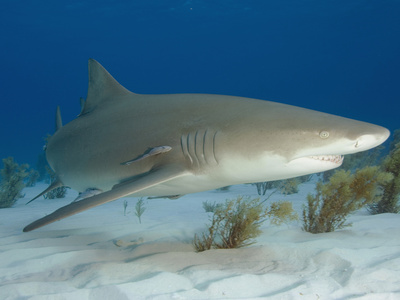•2:17 PM
Sharks are creatures that have scared thousands of generations of human population because they're considered a really dangerous species. However, few people know (and scientists don't fully understand) a process called tonic immobility (also known as thanatosis or cataleptic state).
This concept refers to the natural state of paralysis sharks enter under various stimuli, during which they can mimic lifelessness for up to 15 minutes. The shark will then relax, its dorsal fins will straighten, its breathing will become slow and even and it may be touched or estimulated with virtually no response.
Sharks display tonic immobility as a response to only one well-documented stimulus: being inverted. Other species of shark (e.g. lemon, reef and tiger sharks) also display tonic immobility when their snout is rubbed, as their sensory organs termed the ampullae of Lorenzini are overestimulated. Even exhausting the shark has been proved to initiate this peculiar mode. After behavioural controls are established, a successful chemical repellent will awaken a shark from this tonic state and will simply swim away with no apparent harm done. This behaviour has been registered only in several shark species: lemon (Negaprion brevirostris), sandbar (Carcharhinus plumbeus), tiger (Galaeocerdo cuvier), blue (Prionace glauca), nurse (Ginglymostoma cirratum), great whites (Carcharodon carcharias) and black-tip sharks (Carcharhinus limbatus).
 |
| Negaprion brevirostris |
 |
| Prionace glauca |
| Galaeocerdo cuvier |
 |
| Carcharhinus plumbeus |
 | |||
| Ginglymostoma cirratum |
 |
| Carcharhinus limbatus |
 |
| Carcharodon carcharias |
This behaviour is highly interesting for scientists, as it provides them a unique opportunity to study certain shark behaviours and physiology.
Above, you can watch a video of a good example of tonic immobilisation. Totally fascinating, isn't it?
SOURCES:
http://www.theepochtimes.com/n2/science/tonic-immobility-shark-whisperers-powers-of-hypnosis-video-63137.html
http://www.ehow.com/info_8722758_causes-tonic-immobility-sharks.html#ixzz2LQxNKRPd
http://www.absoluteastronomy.com/topics/Tonic_immobility (this link will give you examples of tonic immobility in other animals).
DOCUMENTARY: BBC Human planet. 1: The oceans. Minutes 27.30 to 32.45.
Biology
|









0 comentarios: